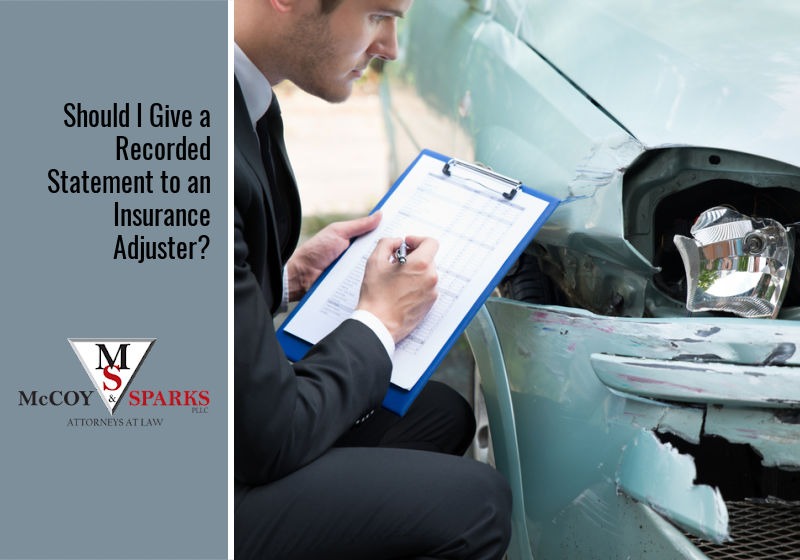
If you were involved in a collision that left you with personal injuries, you’ll need to file a claim with the negligent driver’s insurance company. Insurance companies often request claimants to give recorded statements, but this statement can hurt your likelihood of recovering full compensation for your injuries.
You should never give a recorded statement without the legal assistance of a car accident personal injury attorney. Here’s what you need to know about giving a recorded statement and how to answer insurance adjuster questions.
Should I Give a Recorded Statement to an Insurance Adjuster?
When a liable insurance company contacts an injured claimant and requests for them to give a recorded statement, they’re trying to gather evidence against them. The insurance company is primarily interested in saving money, so they want the claimant to say something on record that will hurt their claim. Anything that a victim says in their recorded statement has the potential to be used against them and may reduce their compensation.
Insurance companies will often contact car accident victims within a few days of their accidents so that they’re unprepared. If you haven’t spoken to a car accident attorney yet, you’re more likely to misspeak or disclose information that hurts your case.
The insurance adjuster may even ask you intentionally misleading questions so that they can use your answers against you. You may unintentionally admit fault in the accident or say something indicating that your injuries aren’t serious.
Insurance companies often contact claimants before they have the chance to have their injuries fully diagnosed, so an injured person may grossly underestimate the severity of their injuries when giving their recorded statement. Plus, an unprepared claimant may misspeak or say something incorrect because of a lack of preparation or nervousness. If you leave a recorded statement with inaccurate information, the insurance company can use that against you to minimize your claim or make the case that you were partially or fully liable for the wreck in question.
What makes this tactic all the more deceptive is that insurance companies sometimes aim to collect recorded statements from those who are mentally impacted by their injuries. Car accident injuries can affect a victim’s ability to focus and give clear answers to an insurance adjuster, and victims may be on medication that impacts their ability to think clearly. Anything that the injured victim says can be used against them by the insurance company.
Never speak to the liable insurance company without legal representation. Otherwise, you may struggle to recover the money you deserve for your wreck.
What Questions Does an Insurance Adjuster Ask?
Insurance adjusters usually ask questions about the wreck and the claimant’s injuries. They’ll often ask intentionally misleading or vague questions in order to confuse the claimant, increasing the likelihood that they’ll say something that could hurt their claim. These intentionally tricky questions encourage claimants to overshare details regarding the accident that may hurt their case.
For example, a claimant may accidentally divulge that they were going above the speed limit at the time of the wreck or were engaging in a distraction, such as eating or personal grooming. These actions may not have even contributed to the wreck in question, but the insurance company will use the information to deny or devalue the victim’s claim.
The insurance adjuster may also ask questions that aim to depreciate the compensation the victim will receive for their injuries, and it’s critical to remember that saying something even seemingly trivial can hurt your claim. If you say something like, “I’m starting to feel better,” or, “I think I’m just a little sore,” the insurance company can use these statements as evidence that your injuries are not serious.
Finally, the insurance adjuster will likely ask about any previous accidents or injuries you’ve suffered. They ask these questions because they’re attempting to make the case that the accident in question didn’t cause your injuries.
Let’s say that you suffered a lower back injury in your wreck. The insurance adjuster could ask if you’ve suffered any previous back injuries. If you say that you suffered from a slip and fall injury years prior that damaged your back, the insurance company may argue that their client didn’t cause your injuries. They could claim that you were already suffering from a lower back injury before the wreck.
Am I Legally Obligated to Give a Recorded Statement?
You are in no way legally obligated to leave a recorded statement with the liable insurance company, and doing so will only hurt your claim. When it comes to your own insurance company, you’ll need to comply with your policy’s terms and conditions, which may require you to issue a statement, but you’re under no such obligation with the liable party’s insurance company.
Remember, you should avoid speaking with the liable insurance company entirely and instead communicate through a car accident attorney.
Contact a Central Kentucky Car Accident Attorney
If you suffered a vehicular collision that left you with personal injuries, you need to contact a car accident attorney as soon as possible. A skilled car accident attorney can present your case on your behalf and handle communication with the liable party’s legal representation and insurance company.
For expert car accident lawyers in Central Kentucky, contact the legal team at McCoy & Sparks Attorneys at Law. We’re dedicated to our clients and will work to maximize the amount of compensation you’ll receive for your injuries. You may be able to recover money for medical bills, pain and suffering, lost wages, loss of future earnings, and more.
Schedule your free case consultation today by calling us at 844-459-9467, or you can schedule it online here.

